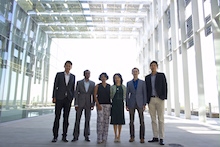
New NASA-Affiliated Center Opening at UC Merced
A $5 million grant will lead to innovative nanotechnology solutions for space exploration missions and increase the number of science, technology, engineering and math graduates
Quick Facts • MACES is the largest center funded by an outside agency so far at UC Merced. • Researchers plan to work with students to develop projects for NASA. • Professors and staff members will also actively recruit and retain STEM scholars by working with area high schools and CSU students. Four of the six faculty are from the Physics Graduate Group
MERCED, Calif. — NASA has awarded a group of researchers at the University of California, Merced, $5 million to establish the campus’s largest extramurally funded research and education center to date, designed to benefit current and future students and contribute to NASA’s missions.
Professor Jennifer Lu, with colleagues Vincent Tung, Tao Ye, Sayantani Ghosh, Anand Subramaniam and Min Hwan Lee, proposed the Merced Nanomaterials Center for Energy and Sensing (MACES) to harness the university’s strong nanomaterial-based research programs and help develop a pipeline for highly qualified workers in science, technology, engineering and math (STEM).
Lu and her two senior co-investigators, Ye and Ghosh, plan to create new materials solutions enabling high-performance, reliable, compact and lightweight energy conversion, storage and sensing devices for NASA missions.
The center’s affiliates — UC Merced Stem Cell Instrumentation Foundry Director Anand Gadre and STEM Resource Center coordinator Petia Gueorguieva; Jin Zhang and Michael Oye from UC Santa Cruz; and collaborators at NASA Research Centers — will work withMACES to recruit, train and retain STEM students. They’ll create a scholarship program to provide research opportunities for undergraduate students — particularly underrepresented students —and provide research fellowships to eight or more graduate students annually.
Nationally, only about 4 percent of Hispanics between the ages of 25 and 34 have associate’s degrees or higher in STEM fields. Lu said this low number presents a serious challenge to meet the need for a world-leading STEM workforce. At UC Merced, 46 percent of undergraduate students are Hispanic underrepresented minorities, while 30 percent of UC Santa Cruz students fit the same category.
“This demographic profile offers an ideal opportunity to make a positive long-term impact on underrepresented minorities,” Lu said.
The center aims to enrich STEM education with an emphasis on hands-on learning and build the STEM workforce pipeline through outreach to local high school students as well as undergraduate and graduate students from the two UC campuses and nearby state universities.
“Through rigorous training, our goal is to train Ph.D. graduates who will evolve as major contributors to NASA’s mission,” Lu said. “The new center will promote collaborative research and cultivate coordinated research efforts between our faculty members. It will also provide seed funding during the grant period to stimulate and attract innovative ideas.”
They plan to offer multidisciplinary-based education, a nanotechnology emphasis track for graduate students, a seminar course, undergraduate research opportunities to help build students’ confidence, a CSU undergraduate student summer research program, field trips to NASA, professional development workshops for high school science teachers and an annual open house for high school students. The center will also host the annual Dinner with a Scientist event, public lectures and YouTube videos with NASAscientists and other researchers.
“We are very proud and grateful for the work of Professor Lu and her colleagues. This effort will serve the dual role of yielding critical research on new materials as well as educating the country’s future STEM workforce,” Vice Chancellor for Research and Economic Development Sam Traina said. “This is a perfect example of how our faculty members are serving the people of California through UC’s dual mission of research and education. Paraphrasing UC President Janet Napolitano, UC teaches for California and researches for the world.”

